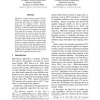Free Online Productivity Tools
i2Speak
i2Symbol
i2OCR
iTex2Img
iWeb2Print
iWeb2Shot
i2Type
iPdf2Split
iPdf2Merge
i2Bopomofo
i2Arabic
i2Style
i2Image
i2PDF
iLatex2Rtf
Sci2ools
119
click to vote
ACL
2009
2009
Quadratic-Time Dependency Parsing for Machine Translation
Efficiency is a prime concern in syntactic MT decoding, yet significant developments in statistical parsing with respect to asymptotic efficiency haven't yet been explored in MT. Recently, McDonald et al. (2005b) formalized dependency parsing as a maximum spanning tree (MST) problem, which can be solved in quadratic time relative to the length of the sentence. They show that MST parsing is almost as accurate as cubic-time dependency parsing in the case of English, and that it is more accurate with free word order languages. This paper applies MST parsing to MT, and describes how it can be integrated into a phrase-based decoder to compute dependency language model scores. Our results show that augmenting a state-ofthe-art phrase-based system with this dependency language model leads to significant improvements in TER (0.92%) and BLEU (0.45%) scores on five NIST Chinese-English evaluation test sets.
ACL 2009 | Computational Linguistics | Dependency Language Model | Maximum Spanning Tree | Parsing |
Related Content
| Added | 16 Feb 2011 |
| Updated | 16 Feb 2011 |
| Type | Journal |
| Year | 2009 |
| Where | ACL |
| Authors | Michel Galley, Christopher D. Manning |
Comments (0)

